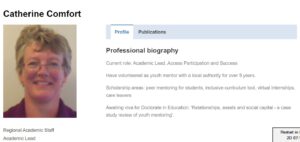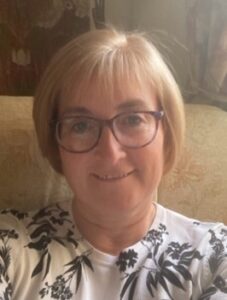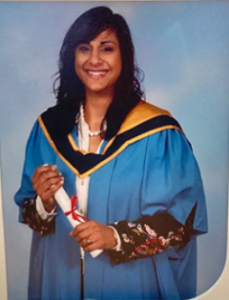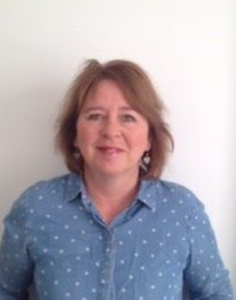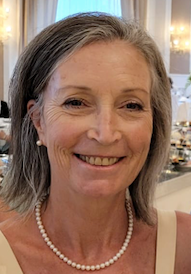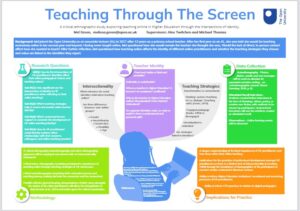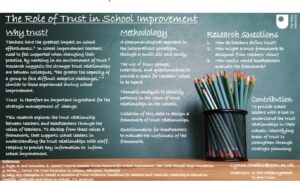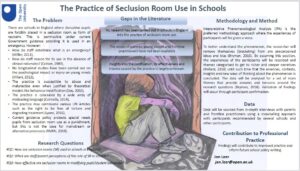 The OU’s conference on professionalism and posthumanism fascinated me as someone who has worked in campaigning around literacy and education in England and Scotland. I now work in early years practice while pursuing an education doctorate. During this time, I have witnessed policy changes come and go. Despite the frustrations of governments and institutions, I remain optimistic that we can work through them because we have to, especially with the looming challenges of the climate crisis. In my experience, the short-term illusion that the neo-liberal world offers can be alluring, but there is no silver bullet to anything. I have been influenced by Vivian Gussin Paley’s (reference) storytelling approach to literacy, which is subtle and complex and has stayed with me much longer than England’s national literacy hour policy. Therefore, the problem I focus on is balancing the demands of professionalism and posthumanism in the early years’ sector.
The OU’s conference on professionalism and posthumanism fascinated me as someone who has worked in campaigning around literacy and education in England and Scotland. I now work in early years practice while pursuing an education doctorate. During this time, I have witnessed policy changes come and go. Despite the frustrations of governments and institutions, I remain optimistic that we can work through them because we have to, especially with the looming challenges of the climate crisis. In my experience, the short-term illusion that the neo-liberal world offers can be alluring, but there is no silver bullet to anything. I have been influenced by Vivian Gussin Paley’s (reference) storytelling approach to literacy, which is subtle and complex and has stayed with me much longer than England’s national literacy hour policy. Therefore, the problem I focus on is balancing the demands of professionalism and posthumanism in the early years’ sector.
Solution 1: Use the principles of posthumanism to unite concerns for eco and social justice and inspire us to be direct yet positive and affirmative in conversations with colleagues, children, and their parents. My current work with posthumanism has revitalized and challenged me in equal measure. It has inspired me to keep questioning, unite eco and social justice concerns, and be more direct yet positive and affirmative in conversations with colleagues, children, and their parents. I used to take pride in NOT being a teacher, but I have learned to be careful not to seek to belong through an anti-identity. As someone who has chosen to take the ‘many-jobs’ and ‘multiple-identities’ route, I have gained freedom of thinking but also experienced disconnection and a lack of confidence. But it has been an overall positive experience because it has made me find ways of being optimistic rather than just becoming a grumpy, dissatisfied, or burnt-out employee (past experiences!). This session gave me a new perspective on nomadism.
Solution 2: Develop a nuanced understanding of professionalism that values the personal, bodies, and emotions in caring professions like working in the early years. I appreciate that professionalism is a lifelong pursuit (Wall, 2014), having values and striving to be the best version of oneself in any situation, whether paid or not. However, I resist the terminology because it opposes the personal bodies and emotions central to caring professions like working in the early years. I wonder why we worry so much about the word or concept of professionalism and whether it is only because the early years’ sector is often left out of it. Nevertheless, I happily embrace different words to describe my job and use my energies elsewhere. While I am currently employed in a role that I enjoy, I have experienced the fragility of my identity when it is too connected with jobs and employment. Therefore, I try to think of myself as a professional while at the same time concentrating on significant values in my life, not just the parts that provide income and status through paid work. I also wonder how those I teach or spend time with think of me and whether it matters. Parents may have a consumerist view of the early years’ experience (May-Yin Lim, 2015), but I try to understand it rather than feel overwhelmed.
In conclusion, my reflections on professionalism and posthumanism have made me question the language and concepts used to describe our work and identities. As we face more significant challenges in the future, it is essential to remain optimistic, keep questioning, and prioritize the values that guide our work and lives.
So, my question is – what does professionalism mean to you
by Sarah Barton
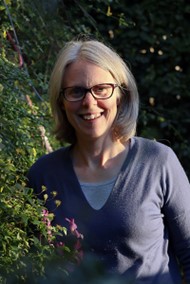

 I am now at the end of Year 2 of my Professional Doctorate, and whilst I have learned loads about methodology, methods, literature searches, alongside this has been a very significant personal learning journey. I realised in the October of my first year, because of many posts on Facebook for ADHD awareness week, that I had an ADHD brain. An absolute clanger at the age of 48 years, but all suddenly made sense! Time blindness, executive functioning difficulties, procrastination, emotional dysregulation, poor working memory were all things I could identify with and
I am now at the end of Year 2 of my Professional Doctorate, and whilst I have learned loads about methodology, methods, literature searches, alongside this has been a very significant personal learning journey. I realised in the October of my first year, because of many posts on Facebook for ADHD awareness week, that I had an ADHD brain. An absolute clanger at the age of 48 years, but all suddenly made sense! Time blindness, executive functioning difficulties, procrastination, emotional dysregulation, poor working memory were all things I could identify with and 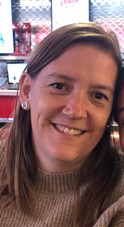 Jo Strang is a Staff Tutor in Social Work at the OU and a second year EdD student. Jo is qualified as a social worker, reflexologist and Emotional Freedom Techniques (EFT) practitioner and has worked in Higher Education as a lecturer since 2010. Her research combines her professional interests and aims to explore social work students’ experiences of learning about EFT, a self-help tool often more easily referred to as ‘acupuncture without needles’. This simple tapping technique can reduce the fight-flight response to situations we experience as challenging and assist in processing a variety of emotions.
Jo Strang is a Staff Tutor in Social Work at the OU and a second year EdD student. Jo is qualified as a social worker, reflexologist and Emotional Freedom Techniques (EFT) practitioner and has worked in Higher Education as a lecturer since 2010. Her research combines her professional interests and aims to explore social work students’ experiences of learning about EFT, a self-help tool often more easily referred to as ‘acupuncture without needles’. This simple tapping technique can reduce the fight-flight response to situations we experience as challenging and assist in processing a variety of emotions.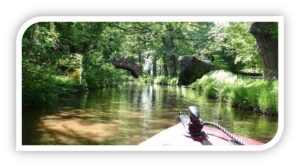
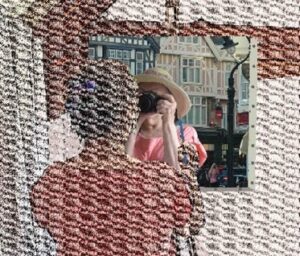 I am a first year, full-time PGR student in the IET school. I am an autistic researcher, and my focus is to investigate inclusive provision and support for autistic students in higher education. I first studied with the OU in 1980 and since then gained my B.Ed degree and worked as a Primary school teacher, Early years co-ordinator, and staff development manager. After a gap of almost 20 years I enrolled for PG study with the OU in online and distance education before applying for a place as a PGR student.
I am a first year, full-time PGR student in the IET school. I am an autistic researcher, and my focus is to investigate inclusive provision and support for autistic students in higher education. I first studied with the OU in 1980 and since then gained my B.Ed degree and worked as a Primary school teacher, Early years co-ordinator, and staff development manager. After a gap of almost 20 years I enrolled for PG study with the OU in online and distance education before applying for a place as a PGR student. Youth mentoring, where young people (mentees) work with adult mentors to achieve change, is a popular government and third sector intervention. Past research, concentrating on quantitative analysis of US programmes, concludes that mentoring achieves significant but modest change. Such research assumes that changes from mentoring can be externally identified and measured, often without hearing the views of those involved.
Youth mentoring, where young people (mentees) work with adult mentors to achieve change, is a popular government and third sector intervention. Past research, concentrating on quantitative analysis of US programmes, concludes that mentoring achieves significant but modest change. Such research assumes that changes from mentoring can be externally identified and measured, often without hearing the views of those involved.